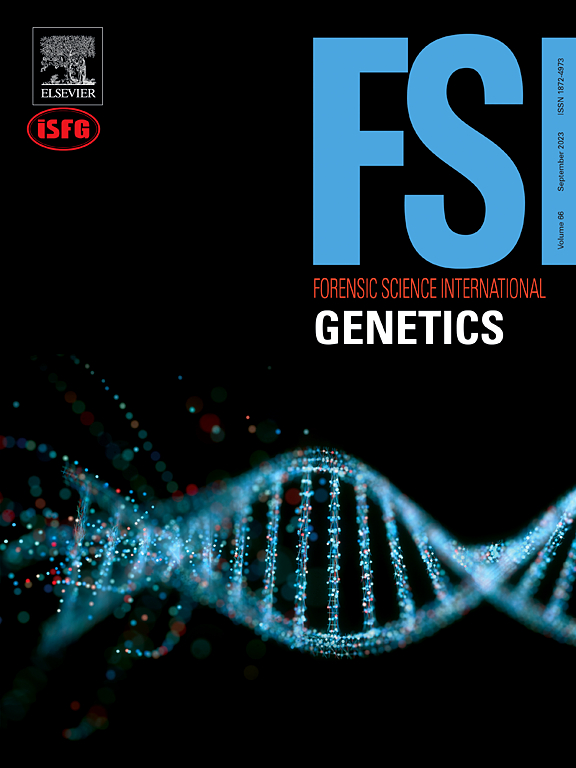

Journal TitleпјҡForensic Science International-genetics
Forensic Science International: Genetics is the premier journal in the field of Forensic Genetics. This branch of Forensic Science can be defined as the application of genetics to human and non-human material (in the sense of a science with the purpose of studying inherited characteristics for the analysis of inter- and intra-specific variations in populations) for the resolution of legal conflicts.
The scope of the journal includes:
Forensic applications of human polymorphism.
Testing of paternity and other family relationships, immigration cases, typing of biological stains and tissues from criminal casework, identification of human remains by DNA testing methodologies.
Description of human polymorphisms of forensic interest, with special interest in DNA polymorphisms.
Autosomal DNA polymorphisms, mini- and microsatellites (or short tandem repeats, STRs), single nucleotide polymorphisms (SNPs), X and Y chromosome polymorphisms, mtDNA polymorphisms, and any other type of DNA variation with potential forensic applications.
Non-human DNA polymorphisms for crime scene investigation.
Population genetics of human polymorphisms of forensic interest.
Population data, especially from DNA polymorphisms of interest for the solution of forensic problems.
DNA typing methodologies and strategies.
Biostatistical methods in forensic genetics.
Evaluation of DNA evidence in forensic problems (such as paternity or immigration cases, criminal casework, identification), classical and new statistical approaches.
Standards in forensic genetics.
Recommendations of regulatory bodies concerning methods, markers, interpretation or strategies or proposals for procedural or technical standards.
Quality control.
Quality control and quality assurance strategies, proficiency testing for DNA typing methodologies.
Criminal DNA databases.
Technical, legal and statistical issues.
General ethical and legal issues related to forensic genetics.
Forensic ScвҖӢвҖӢience InternationalпјҡGenetics жҳҜжі•еҢ»йҒ—дј еӯҰйўҶеҹҹзҡ„йЎ¶зә§жңҹеҲҠгҖӮжі•еҢ»еӯҰзҡ„иҝҷдёҖеҲҶж”ҜеҸҜд»Ҙе®ҡд№үдёәе°ҶйҒ—дј еӯҰеә”з”ЁдәҺдәәзұ»е’Ңйқһдәәзұ»жқҗж–ҷпјҲеңЁз§‘еӯҰж„Ҹд№үдёҠпјҢж—ЁеңЁз ”究йҒ—дј зү№еҫҒд»ҘеҲҶжһҗз§ҚзҫӨдёӯзҡ„з§Қй—ҙе’Ңз§ҚеҶ…еҸҳејӮпјүжі•еҫӢеҶІзӘҒзҡ„и§ЈеҶігҖӮ
жңҹеҲҠиҢғеӣҙеҢ…жӢ¬пјҡ
дәәзұ»еӨҡжҖҒжҖ§зҡ„еҸ–иҜҒеә”з”ЁгҖӮ
жЈҖжөӢдәІеӯҗе…ізі»е’Ң其他家еәӯе…ізі»гҖҒ移民жЎҲ件гҖҒеҜ№еҲ‘дәӢжЎҲ件дёӯзҡ„з”ҹзү©жұЎжёҚе’Ңз»„з»ҮиҝӣиЎҢеҲҶеһӢгҖҒйҖҡиҝҮ DNA жЈҖжөӢж–№жі•иҜҶеҲ«дәәдҪ“йҒ—йӘёгҖӮ
жҸҸиҝ°жі•еҢ»ж„ҹе…ҙи¶Јзҡ„дәәзұ»еӨҡжҖҒжҖ§пјҢзү№еҲ«е…іжіЁ DNA еӨҡжҖҒжҖ§гҖӮ
еёёжҹ“иүІдҪ“ DNA еӨҡжҖҒжҖ§гҖҒеҫ®еһӢе’Ңеҫ®еҚ«жҳҹпјҲжҲ–зҹӯдёІиҒ”йҮҚеӨҚеәҸеҲ—пјҢSTRпјүгҖҒеҚ•ж ёиӢ·й…ёеӨҡжҖҒжҖ§ (SNP)гҖҒX е’Ң Y жҹ“иүІдҪ“еӨҡжҖҒжҖ§гҖҒmtDNA еӨҡжҖҒжҖ§д»ҘеҸҠе…·жңүжҪңеңЁжі•еҢ»еә”з”Ёзҡ„д»»дҪ•е…¶д»–зұ»еһӢзҡ„ DNA еҸҳејӮгҖӮ
з”ЁдәҺзҠҜзҪӘзҺ°еңәи°ғжҹҘзҡ„йқһдәәзұ» DNA еӨҡжҖҒжҖ§гҖӮ
жі•еҢ»ж„ҹе…ҙи¶Јзҡ„дәәзұ»еӨҡжҖҒжҖ§зҡ„зҫӨдҪ“йҒ—дј еӯҰгҖӮ
дәәеҸЈж•°жҚ®пјҢе°Өе…¶жҳҜжқҘиҮӘз”ЁдәҺи§ЈеҶіжі•еҢ»й—®йўҳзҡ„ж„ҹе…ҙи¶Јзҡ„ DNA еӨҡжҖҒжҖ§гҖӮ
DNA еҲҶеһӢж–№жі•е’Ңзӯ–з•ҘгҖӮ
жі•еҢ»йҒ—дј еӯҰдёӯзҡ„з”ҹзү©з»ҹи®ЎеӯҰж–№жі•гҖӮ
еңЁжі•еҢ»й—®йўҳпјҲдҫӢеҰӮдәІеӯҗйүҙе®ҡжҲ–移民жЎҲ件гҖҒеҲ‘дәӢжЎҲ件е·ҘдҪңгҖҒйүҙе®ҡпјүдёӯиҜ„дј° DNA иҜҒжҚ®гҖҒз»Ҹе…ёе’Ңж–°зҡ„з»ҹи®Ўж–№жі•гҖӮ
жі•еҢ»йҒ—дј еӯҰж ҮеҮҶгҖӮ
зӣ‘з®Ўжңәжһ„е…ідәҺж–№жі•гҖҒж Үи®°гҖҒи§ЈйҮҠжҲ–зӯ–з•Ҙзҡ„е»әи®®жҲ–зЁӢеәҸжҲ–жҠҖжңҜж ҮеҮҶзҡ„е»әи®®гҖӮ
иҙЁйҮҸжҺ§еҲ¶гҖӮ
иҙЁйҮҸжҺ§еҲ¶е’ҢиҙЁйҮҸдҝқиҜҒзӯ–з•ҘпјҢDNA еҲҶеһӢж–№жі•зҡ„иғҪеҠӣйӘҢиҜҒгҖӮ
зҠҜзҪӘ DNA ж•°жҚ®еә“гҖӮ
жҠҖжңҜгҖҒжі•еҫӢе’Ңз»ҹи®Ўй—®йўҳгҖӮ
дёҺжі•еҢ»йҒ—дј еӯҰзӣёе…ізҡ„дёҖиҲ¬йҒ“еҫ·е’Ңжі•еҫӢй—®йўҳгҖӮ
| еӨ§зұ»еӯҰ科 | е°Ҹзұ»еӯҰ科 | еҲҶеҢә | TopжңҹеҲҠ | з»јиҝ°жңҹеҲҠ |
| Q2 | Q2 Q1 | 2еҢә |
| еӨ§зұ»еӯҰ科 | е°Ҹзұ»еӯҰ科 | еҲҶеҢә |
| Q2 | Q2 Q1 | 2еҢә |
| жңҹеҲҠеҗҚз§° | йўҶеҹҹ | дёӯ科йҷўеҲҶеҢә | еҪұе“Қеӣ еӯҗ |
| Language Speech And Hearing Services In Schools | еҢ»еӯҰ | 2еҢә | 2.400 |
| International Journal Of Bipolar Disorders | еҢ»еӯҰ | 2еҢә | 4.000 |
| International Journal Of Bipolar Disorders | еҢ»еӯҰ | 2еҢә | 4.000 |
| Seminars In Nuclear Medicine | еҢ»еӯҰ | 2еҢә | 4.900 |
| Current Allergy And Asthma Reports | еҢ»еӯҰ | 2еҢә | 5.500 |
| Current Obesity Reports | еҢ»еӯҰ | 2еҢә | 8.800 |